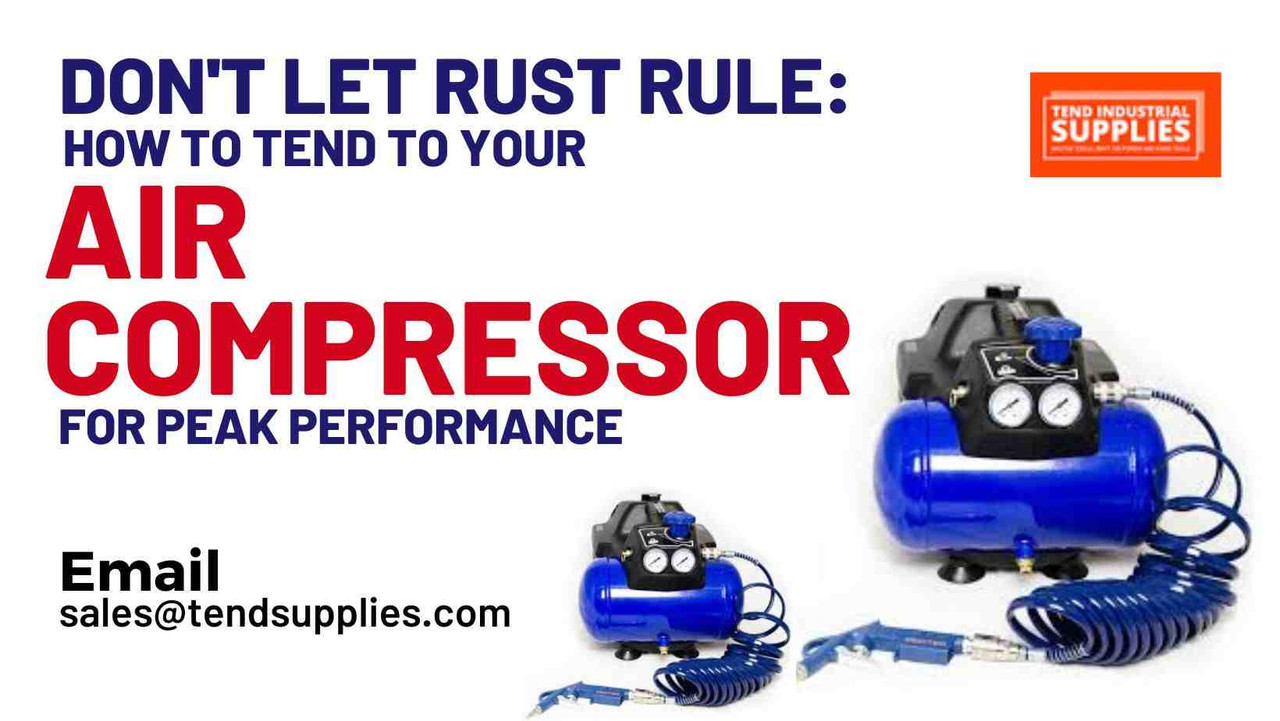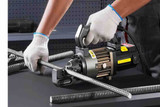Don't Let Rust Rule: How to Tend to Your Air Compressor for Peak Performance
Maintaining your air compressor is crucial for ensuring its longevity and optimal performance. Rust is one of the biggest enemies of air compressors, leading to reduced efficiency and potential breakdowns. This guide will provide essential tips on how to tend to your air compressor, prevent rust, and ensure peak performance.
Key Takeaway
Proper maintenance is essential for ensuring your air compressor's longevity and peak performance. Following these tips and techniques can prevent rust, avoid costly repairs, and keep your air compressor running smoothly for years.
Understanding Air Compressor Maintenance
Air compressors are vital in various applications, from automotive repair to industrial manufacturing. Proper maintenance is essential to keep them running smoothly and efficiently.
Why is Air Compressor Maintenance Important?
- Prevent Rust and Corrosion: Regular maintenance helps prevent rust and corrosion, which can damage internal components.
- Ensure Peak Performance: Well-maintained air compressors operate more efficiently, providing consistent pressure and flow rates.
- Extend Lifespan: Proper care and maintenance extend the life of your air compressor, reducing the need for costly repairs or replacements.
Essential Air Compressor Maintenance Tips
- Regular Inspection
- Inspect your air compressor regularly for signs of wear and tear. Look for rust, leaks, and damaged parts.
- Drain the Tank
- Drain the air compressor tank daily to remove accumulated moisture. Moisture can lead to rust and reduce the compressor's efficiency.
- Check and Replace Filters
- Clean or replace air filters regularly. Dirty filters can restrict airflow and reduce the efficiency of your air compressor.
- Lubrication
- Ensure all moving parts are properly lubricated. Follow the manufacturer's recommendations for lubrication intervals and types of lubricants.
- Tighten Bolts and Fasteners
- Check and tighten all bolts and fasteners regularly to ensure they are secure. Vibrations from the compressor can cause them to loosen over time.
Preventing Rust in Your Air Compressor
Air compressors are workhorses in garages and workshops everywhere. But like any machine, they need regular maintenance to function correctly and last long. One of the biggest enemies of an air compressor is rust, which can form inside the tank and cause problems down the line. Here are some steps to prevent air compressor rust and keep your machine running smoothly.
- Drain the tank regularly: This is the most critical step to prevent rust. The compression process creates moisture in the tank, which can lead to rust. Make sure to drain the tank after every use, or at least daily, if you're using the compressor frequently. There is usually a drain valve at the bottom of the tank; simply open the valve and let the water drain out.
- Use an aftercooler: An aftercooler is a device that helps to remove moisture from the compressed air before it enters the tank. This can significantly reduce the amount of condensation that forms in the tank and thus reduce the risk of rust.
- Consider an automatic drain: If you forget to drain the tank regularly, you can install an automatic drain valve. This will automatically drain the tank at a preset pressure, ensuring no moisture buildup.
- Keep the compressor in a dry environment: Store your air compressor in a dry place. This will help to reduce the amount of moisture in the air that can come into contact with the tank.
- Use a rust inhibitor (for some models): Some rust inhibitor products can be added to the air compressor oil. These products can help coat the inside of the tank and protect it from rust. However, consult your air compressor's manual before using any additives, as some manufacturers advise against them.
Rust is a common issue in air compressors, especially in humid environments. Here are some tips to prevent rust:
- Use a Moisture Trap
- Install a moisture trap or water separator to remove moisture from the air before it enters the compressor tank.
- Store in a Dry Place
- Store your air compressor in a dry, well-ventilated area to minimize exposure to humidity.
- Use Rust Inhibitors
- Apply rust inhibitors to the inside of the tank to protect it from rust and corrosion.
- Regular Draining
- As mentioned, drain the tank regularly to remove moisture and prevent rust buildup.
- Keep the Tank Pressurized
- Keeping the tank pressurized can help reduce the formation of rust. Make sure to release the pressure before performing any maintenance.
Troubleshooting Common Air Compressor Issues
Even with regular maintenance, you may encounter some common air compressor problems. Here are solutions to a few typical issues:
- Reduced Airflow: Check for dirty filters, leaks, or hose blockages. Clean or replace filters and repair any leaks.
- Overheating: Ensure the compressor is well-ventilated and the cooling system functions properly. Clean any dust or debris from the cooling fins.
- Excessive Noise: Check for loose bolts and fasteners. Ensure the compressor is on a stable surface and not vibrating excessively.
Advanced Air Compressor Maintenance Techniques
For those who rely heavily on their air compressors, advanced maintenance techniques can help maintain peak performance:
- Oil Analysis
- Regularly test the oil in your air compressor for contaminants and degradation. Replace the oil as needed to ensure optimal lubrication and performance.
- Vibration Analysis
- Perform vibration analysis to detect any unusual vibrations that could indicate mechanical issues. Addressing these issues early can prevent more significant problems later.
- Infrared Thermography
- Infrared thermography can detect hot spots and potential electrical issues. This non-invasive technique can help identify problems before they cause significant damage.
Frequently Asked Questions (FAQs)
- How often should I drain my air compressor tank?
- You should drain your air compressor tank daily to remove accumulated moisture and prevent rust.
- What type of oil should I use for my air compressor?
- Use the oil recommended by the manufacturer. Typically, non-detergent, synthetic oils are preferred for air compressors.
- How do I know if my air filter needs to be replaced?
- If you notice a decreased airflow or increased noise, it may be time to clean or replace the air filter.
- What are the signs of rust in my air compressor?
- Common signs of rust include discolored water when draining the tank, reduced performance, and visible rust on the tank's exterior.
- Can I repair a rusted air compressor tank?
- It is not recommended to repair a rusted tank. If it is significantly rusted, it should be replaced to ensure safety and performance.
Call to Action
Visit Tend Industrial Supplies for high-quality air compressors and maintenance supplies. Our extensive range of products ensures you have everything you need to keep your air compressor in top condition. For more information and expert advice, contact us at sales@tendsupplies.com.









